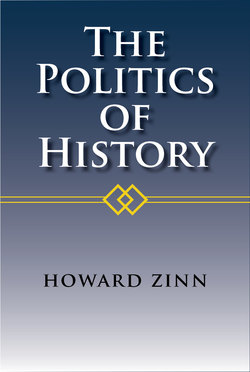Читать книгу The Politics of History - Howard Boone's Zinn - Страница 15
На сайте Литреса книга снята с продажи.
ОглавлениеPART TWO
ESSAYS IN AMERICAN HISTORY
4
Inequality
Somehow, the notion of American uniqueness persists. It is “God’s Country and Mine,” Jacques Barzun has said.1 There is a common belief that our country has from birth been favored, by Providence or by Circumstance, in being unencumbered with harsh class lines, with solidified privilege, with a stubborn aristocracy, with a mass of illiterate peasantry, with all those things that plagued Europe until the dawn of modern times. A naked continent, rare idealism and courage among settlers weeded out by hardship and three thousand miles of ocean, the equalitarian demands of the frontier—these combined, we are often told, for a physically crude but socially immaculate conception.
Our birth, therefore, was of a new civilization, truly new, not a copy of the Old World. In Tocqueville’s words, we were “born free.”
A Whig preacher named Calvin Colton in 1844 summed up a belief about America that still represents the dominant self-image: 2
Ours is a country where men start from an humble origin … and where they can attain to the most elevated positions, or acquire a large amount of wealth, according to the pursuits they elect for themselves. No exclusive privileges of birth, no entailment of estates, no civil or political disqualifications stand in their path, but one has as good a chance as another, according to his talents, prudence or personal exertions. This is a country of self-made men, than which nothing better could be said of any state of society.
The self-deception of Colton (there was slavery in the South, and in the North the factory system had a brutal grip on many Americans) applies to every period of this country’s history, from our colonial origins to our imperial present. The fact is, we were born far from free, and far from equal, and through centuries of enormous growth in territory, resources, population, that initial inequality continued.
Why, then, does the myth persist?
Judgments depend on the criteria we use. Americans, evaluating their own country, generally use as their base other places in the world. In all the harping on the special equalitarianism of America, what is really implied, and only occasionally stated, is not that we were really free or really equal but that we were more free and equal than Europe. A new society, physically open and structurally loose, does have—for a time, in some of its parts, to a certain degree—more opportunities for changing one’s status than an old, encrusted society.
Even this comparative statement about American equality depends for its truth on one enormous premise: that we not count the black slaves in America (20 percent of the population on the eve of the American revolution). It started early—the bland assessment of this country after putting the slaves aside. This is one of the unchanging aspects of our self-evaluation—that we mention the Negro with proper lamentation, and then put him in brackets while we make our total judgment of American civilization. Both slavery and segregation have always been treated as special phenomena, to be mentioned then forgotten, because they spoil all estimates about democracy, freedom, and equality in this country.
But even aside from this dishonesty, there is something wrong with the use of other countries—Europe, or Asia to make the contrast even more dramatic—as a basis for evaluation. Why not use as our norm the ideal society, that which has never existed on earth, that mythic society which has eliminated (to use Jacques
Barzun’s phrase) “irrational privilege.” I would call irrational that privilege which comes from the distorted distribution of abundant resources.
The distinction between these two criteria (Europe’s rigid class system on the one hand; an ideal society on the other) is not that the first is realistic (comparing us with existing reality elsewhere), while the other is idealistic (measuring us against a goal unattained anywhere). Both are realistic, in the sense that they have effects on reality. But the first suits a historical scholarship which uses the past not only as its starting point but as its end; the second suits a view of history which is designed to change the present toward a desired future. Both kinds of historiography are able to use, with accuracy and competence, the data of the past. But the choice of criteria makes one kind of history contemplative, academic, and the other kind existential, active.
What follows then is a discussion of class inequality in America, drawing briefly on data from two periods—the colonial and the contemporary. The point is not to conclusively prove something about America, but rather to suggestively question the happy myth of equalitarianism, as a way of prodding us to bolder changes than so far called forth by the “welfare state.”
